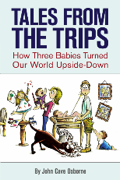Posted on 28. Sep, 2010 by Brian Reid.
In preparation for my presentation at the At-Home Dad Convention on Saturday (you’re going, right), I’ve made sure that my at-home dad statistics page is up to date. I’ve realized that there are a bunch of numbers that I’ve come to rely upon that are no longer being updated, and I’m trying to see if I can track ‘em down before Saturday. (Demographically engaged readers: I’m looking for SIPP child care data more recent than summer, 2006 …)
Of note, I realized that I missed this highly dubious (but encouraging!) survey from Spike TV that said that 73 percent of guys were at least “somewhat” willing to do the at-home dad thing. Food for thought.
Posted on 27. Sep, 2010 by Brian Reid.
Newsweek is aware that *something* is going on with guys. I mean, the evidence is everywhere: the recession hit guys a lot harder than women, social roles are clearly being redefined, women are outearning men, Sweden is doing something right, dogs are sleeping with cats, etc. And they turned that mishmash of fact and anecdote into … a mishmash of an article last week that, ultimately, says nothing.
I have a number of ways I can go with this post. I could encourage everyone to read the only the last paragraph, sigh at the simplistic and silly idea that dads should continue to draw their worth from their jobs (or at least half of their worth), and then take advantage of the 30 minutes that they would have otherwise spent reading the article.
I could do a paragraph-by-paragraph explanation of the errors made (the number of at-home dads has not “stalled at 3 percent”) and the silly implications left unchallenged (that huge majorities of both political parties are committed to paid leave), but then parcel out praise for picking up insight from Joan Williams, Jeremy Adam Smith and Michael Chabon.
Or I could try to put the article in historical context. It seems like the “new macho” that the piece describes isn’t so new at all. I’ll buy a beer at the convention to any guy who can find a Newsweek piece on Robert Bly from 20 years ago talking about the “new macho.” I could drop even older history, noting that the whole man-is-defined-by-his-paid-work meme isn’t some sort of inescapable fact of society; before the industrial revolution, families looked a lot more like the involved-father, post-modern makeup than most people realize.
It seems like everyone does best when there aren’t any expectations at all, and fathers can do what’s best for them or the family without feeling locked into any stereotype. Because there wasn’t always a “right” way to be a man. One of my favorite books on fatherhood is an old, old work by Nathaniel Hawthorne, the guy who wrote “The Scarlet Letter.” He was once left as the primary caretaker of his little boy for 3 weeks, and 20 Days With Julian and Little Bunny by Papa is a charming set of stories about watching his kid grow and explore.
But that book is missing one element that has become standard in almost all first-person accounts of fatherhood (see Michael Lewis or Austin Murphy for a contrast): Hawthorne spends zero time ruminating on whether or not he is swimming against some current of manhood or fatherhood. He’s just a dad, hanging out with his kid.
That’s what we need: less navel-gazing about “why we need to reimagine masculinity” and more being just a dad, hanging out with the kids.
Posted on 24. Sep, 2010 by Brian Reid.
Full disclosure: I have never, as a dad, been explicitly forbidden from engaging in any sort of parental activity based solely on my gender. For a long time, I assumed that excluded dads were something of an urban legend. And then I heard about a Nashville mom interested in keeping dads away. And then I saw Dana Glazer’s wonderful film, Evolution of Dad, which captures, on tape, a mom denying Dana an invitation to a “Mommy & Me” class.
This week, Dana put up the 3-minute clip of the film where the exclusion takes place as part of a larger post at Huffington Post.I’ve been open that I understand “moms’ nights out,” and grabbing beers with the guys. But I remain baffled by anyone who would — in a childrearing environment — shut out parents. Dana puts it eloquently:
There’s a famous quote by Gloria Steinem that I think is worth repeating here: “Women are not going to be equal outside the home until men are equal in it.” There’s certainly been a lot of growth in terms of how the genders work together, but there’s still a great deal of resistance from all sides. As a society, we still hold too tightly to old stereotypes of what moms and dads should be doing — even when reality dictates we should be more open.
Curious: any of you ever been excluded in this way?
Posted on 23. Sep, 2010 by Brian Reid.
Beginning a week from tomorrow, at-home dads from across the country (and, perhaps, a handful of international dads) will gather in Omaha, Nebraska for the annual At-Home Dad Convention. I won’t go on at length about why the convention is special; if you’ve read this blog for any time at all, you know my feeling on the subject. Needless to say, my feelings haven’t changed.
The full schedule and program is up now on the website. I have a speaking slot, in which I will attempt to take a pile of numbers on at-home dad stats and make it compelling. And I’m the weak link; the rest of the program looks fantastic.
Of course, unless you’re within a few hours of Omaha, it’s a bit late to sway you with promises of a good time. So I’ll put an open question out there: if you’re not going, what can I do to bring the event to you? Twitter up a storm? Blog posts? Podcasts? YouTube video? You name it, and I’ll try to make it happen.
AND … in celebration of the convention, I pledge to post every weekday between now and the convention. It’s been a zany fall, but there’s a lot I need to get out there between now and Oct. 2. So keep clicking over here. And I’ll see (some of you) in Omaha.
[IMPORTANT NOTE IN THE COMMENTS: Phil, one of the organizers, reminds that it's not too late to register. So don't take this as discouragement if you're on the fence.]
Posted on 13. Sep, 2010 by Brian Reid.
This weekend saw the first-ever M3 Summit (or Modern Media Man Summit, if you’re not into the whole brevity thing). I spent a couple of hours clicking through Twitter last night (check out the #M3Summit hashtag), and it sounds like those who made it had a great experience. I’ve only seen a couple of blog posts from attendees. I know more are in the works, and if you were there and you post on the summit, let me know and I’ll add those links.
Right now, I’ve seen:
After reading through the posts, two things jumped out at me. The first was how powerful the face-to-face exchange of information with other dads was. This is no surprise. Society still lacks good structures that encourage dads to talk to each other about fatherhood, yet — when those structures are in place — dad-to-dad communication is really something else. This is why the At-Home Dad Convention is such a draw for some of us: it’s the one day a year when job one is topic one. And it’s why I was so excited about Hogan Hilling’s brilliant but now defunct Proud Dads concept. Sounds like M3 caught a little bit of that.
The second item that jumped out at my was the attendance. Dad of Divas called the gathering “intimate,” which matches what I heard from others. Attendance was apparently low. Real low. It’s a little dangerous to over-speculate on why that was, but cost certainly came into it. At the end of the day, for me to attend, it would have been easily four figures for 48 hours. That might have been worth it for a certain kind of program, but the schedule felt heavy on the dad-marketing and less heavy on the actual dad-fathering.
If you look at the history of dads on the web, there are striking few examples of fathers out there because they want to market anything. Most of the online dad stuff I’ve seen has been centered around one of three things: 1) connecting with others (the early Slowlane.com was hugely responsible for creating a sense of at-home dad togetherness), 2) working for social change (it was amazing to see Jeremy Adam Smith go from thoughtful posts at Daddy Dialectic to his ground-breaking book), or 3) telling a personal story (there are tons of examples on the blogroll to the right: guys who are out there to explain what it is that they’re doing, not trying to get a zillion hits). None of those three groups was really in the target market for M3, and I worry that may have dampened interest.
Still, any gathering that draws guys together, from a two-dad trip to the playground to a major conference, is a good thing for the cause of fatherhood. Hope that all of the M3 attendees got a tremendous amount out of it, and I hope that the cause of involved fathering only gets strengthened from here on in.
12, 2010
in Featured
With a little over three hours sleep I got up at 3:15am on Friday morning, put myself together as best as I could and got out the door less than an hour later. Piloting my car to the driving sound of the new Disturbed album I made it down to Atlanta in a little less than five hours thanks to rush hour traffic that slowly my roll for the last twenty miles or so.
Racing (ok, walking quickly) into the Sheraton hoping to get in and registered before the opening keynote started I felt the presence of greatness. It turned out to be Superman himself, Ron Mattocks. Shortly thereafter I got to shake hands with Chris Singer and thus began my adventure at the Modern Media Man Summit.
Overall it was a great, albeit short, time. While we were going down for all the great content the conference organizers had lined up I was excited to meet a great group of men and dads.
In addition to Ron and Chris I got to meet the one and only John Cave Osborne (and his lovely bride Lovie), Chris Lewis from Dad of Divas, Kevin Metzger from TheDADvocate Project (please go take his survey if you haven’t already), the fine gentlemen of DadLabs and many others that I know I’m forgetting as I’m trying to do a massive purge of stuff from my head.
I’m pleased to report that every one of them are as nice and genuine as they appear on their blogs. My introverted nature kept me from venturing too far out of my comfort zone once the ice was initially broken with the group I did meet, so there are plenty of people that I regrettably did not speak with.
Another major thing for me was reconnecting with my fellow Bentley alum, C.C. Chapman. It had been nearly a decade since I had seen him in person last when we would meet up for lunch at great Thai place in Newton, Massachusetts.
If you’ve been reading my blog for long enough then you’ll recognize his name because it was him and his various media channels that inspired me to give this whole blogging thing a go. He’s even been kind enough to participate in things like my Any Major Dad series and be interviewed about podcasting for the music column I used to write over at Dad Blogs.
Getting involved in social media has reinvigorated me and gives me hope for my post at-home career. For that I owe a huge debt to C.C., I just hope he never actually expects a check 
Aside from meeting people whose writing is immeasurably better than mine, there were plenty of sessions that I was eager to sit in on. There was a great session by Jason Falls from Social Media Explorer and C.C.’s “State of the Dad”.
Another session from the first day that I liked was an author’s panel featuring Ron, John and Danny Evans of Dad Gone Mad. All three gentlemen were funny and informative as they shared their stories of getting their books published through both traditional and self-publishing channels.
I closed out my first day of action by terrorizing the streets of Atlanta by test driving some of the vehicles that Chevrolet brought with them to the conference. They were the M3 Summit’s headlining sponsor and really put on quite a show (I’ll touch on this a little more tomorrow).
The second day there was lots of great information about Dads and Brands in the morning keynote by Dad Central Consulting and a great session on Volunteerism before I had to hit the road home. That last one was of particular interest to me as I am determined to incorporate a social good aspect in any business venture I pursue in the future.
If there was anything that I heard over the course of the day and a half that I was able to be there that didn’t sit well with me, it was the opening keynote from Charles J. Orlando that I narrowly missed. Charles is an author and a Facebook evangelist. His claim to fame is that he took his book’s page from 50 “likes” to over 60,000 “likes”.
No doubt that is an impressive feat and he is quite focused on engagement on his page, which is very important. However, he admitted he doesn’t blog, barely updates his site and pretty much all I heard in his speech was Facebook, Facebook, Facebook.
On this point I respectfully disagree. Facebook is a great tool, but it shouldn’t be your be all end all if you are looking to develop a business or a brand. You don’t control Facebook and they quite often change the rules of the game whenever they feel like it. I am firmly of the opinion that your blog or site, something you own and control, should always be your home base.
The entire time he was speaking all I could wonder if Christoper S. Penn would be banging his head against the table if he was sitting in the room right then.
Other than that, it was an excellent time and a fun event for my very first social media conference. My sincere hope is that things went well enough for the sponsors and the organizers that this is the first of many and that it will grow with each passing year.
And if you’re wondering about the title of this post, well, that is a tip of the cap to Mr. Mattocks. You can read all about Chuck Norris and his presence at the M3 Summit by perusing Ron’s Twitter stream or searching the #M3Summit hashtag.
Photo credit: dsearls on Flickr
 Bookmark & Share
Bookmark & Share
Tagged as: Atlanta, C.C. Chapman, Chevrolet, Chuck Norris, Facebook, Flickr, Modern Media Man Summit, Online Communities, Social media, Twitter
blog comments powered by
Posted on 12. Sep, 2010 by Brian Reid.
So here is the bad news: Amazon just started a new program designed to help personalize the shopping experience for parents. That’s not the bad news. The bad news is the name: “Amazon Mom.” It has all of the exclusionary, mom-focused thinking that drives me so nuts about diapers baked right into the title.
The good news is that Amazon knows that dads are out there, and they are explicit that we’re welcome:
I am a Dad (or Grandma, or Aunt) - am I eligible?
• Yes. Despite the name, Amazon Mom is open to anyone who is responsible for caring for a baby or young child-“Amazon Primary Caregiver” just didn’t have the same ring to it. Kidding aside, we chose this name because we noticed moms in social communities (like our Amazon discussion boards) looking to connect and share information about products and problems with other moms. We wanted a name that would let these groups know that this program was created with their unique needs in mind.
On second thought, maybe that level of complete tone-deafness (“We wanted a name that would let [moms] know that this program was created with their unique needs in mind.”) is bad news, too.
I would really be ranting here, except that I can’t do any better than Greg over at DaddyTypes.com, who isn’t having any of the target-market argument:
Where to even start? “Despite the name”? “created with their [sic] unique [sic] needs in mind”? If it’s “tailored to your family’s needs,” why not call it Amazon Family? Or Amazon Parent? If 85% of the customers turn out to be white, would they call it Amazon White People and just figure the other 15% will suck it up and sign on?
As they say: go read the whole thing.
I am a Dad (or Grandma, or Aunt) - am I eligible?
• Yes. Despite the name, Amazon Mom is open to anyone who is responsible for caring for a baby or young child-“Amazon Primary Caregiver” just didn’t have the same ring to it. Kidding aside, we chose this name because we noticed moms in social communities (like our Amazon discussion boards) looking to connect and share information about products and problems with other moms. We wanted a name that would let these groups know that this program was created with their unique needs in mind. Read the full FAQ.
Posted on 10. Sep, 2010 by Brian Reid.
So the fine folks at P&G have been keeping a low profile, not sending me much in the way of e-mail since Father’s Day, when they embraced dads for at least 24 hours via a Drew Brees-fueled media blitz.
But today, they figured they’d try again, and I received a “Gifts to Grow” e-mail that went like this:
Hello BRIAN,
We hope your summer has been filled with sun and fun. This month, you’ll find great deals for redeeming your points, a code for 5 bonus points and much more. Enjoy the rest of your summer. And be sure to tell other moms about Gifts to Grow. (ital. mine)
Now, I have been mocked for my obsession with diaper marketing (especially since it’s been a long time since I actually bought or changed diapers) and my frustration that Pampers keeps assuming I’m a woman, but — c’mon people — they keep baiting me.
And the boycott is back on.
| Hello BRIAN, |
 |
| We hope your summer has been filled with sun and fun. This month, you’ll find great deals for redeeming your points, a code for 5 bonus points and much more. Enjoy the rest of your summer. And be sure to tell other moms about Gifts to Grow. |
Posted on 02. Sep, 2010 by Brian Reid.
For copyright reasons, I can’t pull in the image, but it’s worth clicking over to see the charming Sunday comic from Baby Blues. Nothing I like more than the celebration of fatherhood, in all of its diaper-changing, football-tossing glory.
Posted on 31. Aug, 2010 by Brian Reid.
One of the more impressive changes I’ve seen in dad research in the time I’ve been writing about this is the science base for the ways that fatherhood changes men, biologically. The first in-depth introduction I received was Kyle Pruett’s talk at the 2005 At-Home Dad Convention. In it, he gave some details on the way various hormone levels fluctuate throughout pregnancy and infancy.My eyes were open.
Two years later, Slate did a nice piece of dad hormones, and USA Today followed up around Father’s Day with this gem.
But that’s only the start. This month brings fresh evidence of the ways that dads change over the course of childrearing: oxytocin (the so-called cuddle hormone), which has been long known to shoot up in new moms, shoots up just as much in dads. (This had been discussed before, but never published in a scientific journal.)
The research was straightforward. Eighty couples were followed for 6 months, their oxytocin levels checked a few times during that span. Levels of the hormone were similar in both men and women. What’s confusing is that we don’t really know why men release more oxytocin during this time. (It’s more clear in women, where lactation plans a part.)
What’s really interesting, though, is the conditions under which dads produce the most oxytocin. From the press release:
Finally, the findings revealed that oxytocin levels were associated with parent-specific styles of interaction. Oxytocin was higher in mothers who provided more affectionate parenting, such as more gazing at the infant, expression of positive affect, and affectionate touch. In fathers, oxytocin was increased with more stimulatory contact, encouragement of exploration, and direction of infant attention to objects.
No idea what it means, but it sure sounds like another argument in favor of the “activation parenting” theory, which holds that a crucial part of child development is parents who allow their kids some leeway to explore.
All food for thought. Any long-form journalists want to tackle this?
Posted on 25. Aug, 2010 by Brian Reid.
… and you’d get something similar to what is apparently one of next Julie Roberts vehicles. Last month came the news that the guy behind Glee is at work on a romantic comedy that goes down like this:
In the romantic comedy, Julia will play a working woman married to a stay-at-home husband. She loses her job, their roles are reversed, and she has to adjust to motherhood.
I honestly have no idea how this works as a concept. I’ve long argued that the reason that fish-out-of-water plotlines about dads suddenly thrust into a caregiver role have gotten more and more stale since “Mr. Mom” came out in 1983 is because clueless dads are less and less plausible in an era where at-home dads are being called ho-hum part of the social fabric.
So as cool as a reverse “Mr. Mom” is on some level, I’m not sure a movie about a clueless mom is going to work all that well. In fact, it begs for a first act in which Julia is set up as a completely out-of-touch working mom, which is not a stereotype I’m a big fan of, either.
But if this moves forward, it should prompt some interesting social commentary. This will be well worth tracking.
![]()
 an RSS reader or
an RSS reader or  by email. Also, consider becoming a
by email. Also, consider becoming a  Facebook fan or following me on
Facebook fan or following me on  Twitter.
Twitter.









 Billings, MT, US
Billings, MT, US
 Anglet, Pyrenees-atlantiques, FR
Anglet, Pyrenees-atlantiques, FR
 Rodriguez, Rizal, PH
Rodriguez, Rizal, PH
 Seoul, Soul-t’ukpyolsi, KR
Seoul, Soul-t’ukpyolsi, KR
 Nara, Nara, JP
Nara, Nara, JP
 Jarfalla, Stockholms Lan, SE
Jarfalla, Stockholms Lan, SE
 Toronto, ON, CA
Toronto, ON, CA
 Middelfart, Fyn, DK
Middelfart, Fyn, DK
 Ilford, Greater London, GB
Ilford, Greater London, GB



Login options
Glad you liked it. Would you like to share?
No thanks
Sharing this page …
Thanks! Close
Add New Comment
Showing 3 comments
Subscribe by email Subscribe by RSS